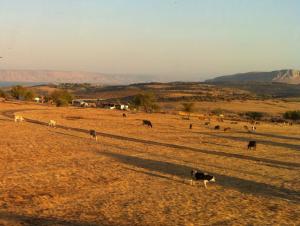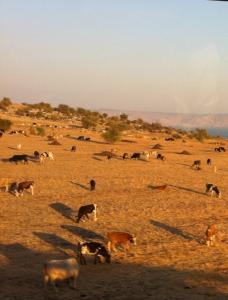 Jonathan Moo in Creation Care: A Biblical Theology of the Natural World (chapter 5) argues that Israel’s relationship with the land teaches us how to approach God’s good creation.
Jonathan Moo in Creation Care: A Biblical Theology of the Natural World (chapter 5) argues that Israel’s relationship with the land teaches us how to approach God’s good creation.
God blessed them and said to them, “Be fruitful and increase in number; fill the earth and subdue it. Rule over the fish in the sea and the birds in the sky and over every living creature that moves on the ground.” Gen. 1:28
The command to fill, subdue and rule is not a call to consume abundantly, as though the world is our private playground. Rather it is a call to act as stewards, respecting both life and land, being mindful of our place in the world.
 The relationship between God, humans, animals and land runs through the Old Testament, and especially the redemption of Israel from Egypt as related in Exodus to Deuteronomy. Ultimately God controls both abundance and lack, prosperity and want. As Moses told the people (Deut. 28):
The relationship between God, humans, animals and land runs through the Old Testament, and especially the redemption of Israel from Egypt as related in Exodus to Deuteronomy. Ultimately God controls both abundance and lack, prosperity and want. As Moses told the people (Deut. 28):
If you fully obey the Lord your God … The Lord will grant you abundant prosperity—in the fruit of your womb, the young of your livestock and the crops of your ground—in the land he swore to your ancestors to give you. The Lord will open the heavens, the storehouse of his bounty, to send rain on your land in season and to bless all the work of your hands. You will lend to many nations but will borrow from none. (v. 11-12)
However, if you do not obey the Lord your God …The Lord will strike you with wasting disease, with fever and inflammation, with scorching heat and drought, with blight and mildew, which will plague you until you perish. The sky over your head will be bronze, the ground beneath you iron. The Lord will turn the rain of your country into dust and powder; it will come down from the skies until you are destroyed. (v. 22-24)
In the Sermon on the Mount, Jesus reminds his listeners:
But I tell you, love your enemies and pray for those who persecute you, that you may be children of your Father in heaven; for he causes his sun to rise on the evil and the good, and sends rain on the righteous and the unrighteous. (Mt. 5:44-45)
There is a covenant of care, but no promise of abundance apart from the providence of God – who is responsible for sun and rain for all.
 Moo argues that sacrificial system itself is a testament to the connections and value of all life. The animals must have intrinsic value to serve as an atonement for human sin. Their lifeblood is to be treated with respect, buried and not consumed (a prohibition retained in the Gentile church Acts 15: 19-20,29)
Moo argues that sacrificial system itself is a testament to the connections and value of all life. The animals must have intrinsic value to serve as an atonement for human sin. Their lifeblood is to be treated with respect, buried and not consumed (a prohibition retained in the Gentile church Acts 15: 19-20,29)
Our point here is simply that the respect that the Israelites were to afford to the life of the animals they killed for food and sacrifice served in part to remind them of their kinship with other creatures and of the gift of life and breath that they shared with them. (p. 93)
The laws of Sabbath and Jubilee years in Leviticus 25 establish a precedent
‘When you enter the land I am going to give you, the land itself must observe a sabbath to the Lord. For six years sow your fields, and for six years prune your vineyards and gather their crops. But in the seventh year the land is to have a year of sabbath rest, a sabbath to the Lord. Do not sow your fields or prune your vineyards. Do not reap what grows of itself or harvest the grapes of your untended vines. The land is to have a year of rest.
…
Consecrate the fiftieth year and proclaim liberty throughout the land to all its inhabitants. It shall be a jubilee for you; each of you is to return to your family property and to your own clan. The fiftieth year shall be a jubilee for you; do not sow and do not reap what grows of itself or harvest the untended vines. For it is a jubilee and is to be holy for you; eat only what is taken directly from the fields. In this Year of Jubilee everyone is to return to their own property.
…
The land must not be sold permanently, because the land is mine and you reside in my land as foreigners and strangers. Throughout the land that you hold as a possession, you must provide for the redemption of the land.
Moo summarizes:
The land belongs to God, and it is only by his grace and goodness that Israel resides there. The Israelite farmer is thus a tenant farmer whose life is finally in the service of God himself as owner and Lord. (p. 96)
Israel’s relationship to the land must reflect God’s purposes for it, as he is its true owner and ruler. God’s people are to live in ongoing awareness of their dependence upon God to treat the land as a gift, to exercise restraint in their use of the land’s resources and in their treatment of other living creatures, and to honor the land and its life as of value to God. … Above all it is in the practice of Sabbath rest and Jubilee that Israelites are called to entrust themselves to God’s good keeping and to reveal by their actions the reality of what they claim to believe about their Creator and Redeemer God. (p. 97)
While Sabbath and Jubilee years are not a continuing command for the church, the reality that we are but ‘tenant farmers’ remains. Everything we have and use belongs to God.
What ways can and should we today acknowledge that we are but ‘tenant farmers?’
What does this mean for the way we live in the world?
If you wish to contact me directly you may do so at rjs4mail[at]att.net
If interested you can subscribe to a full text feed of my posts at Musings on Science and Theology.
The link to the book above is a paid link. Go with this one if you prefer: Creation Care: A Biblical Theology of the Natural World.











